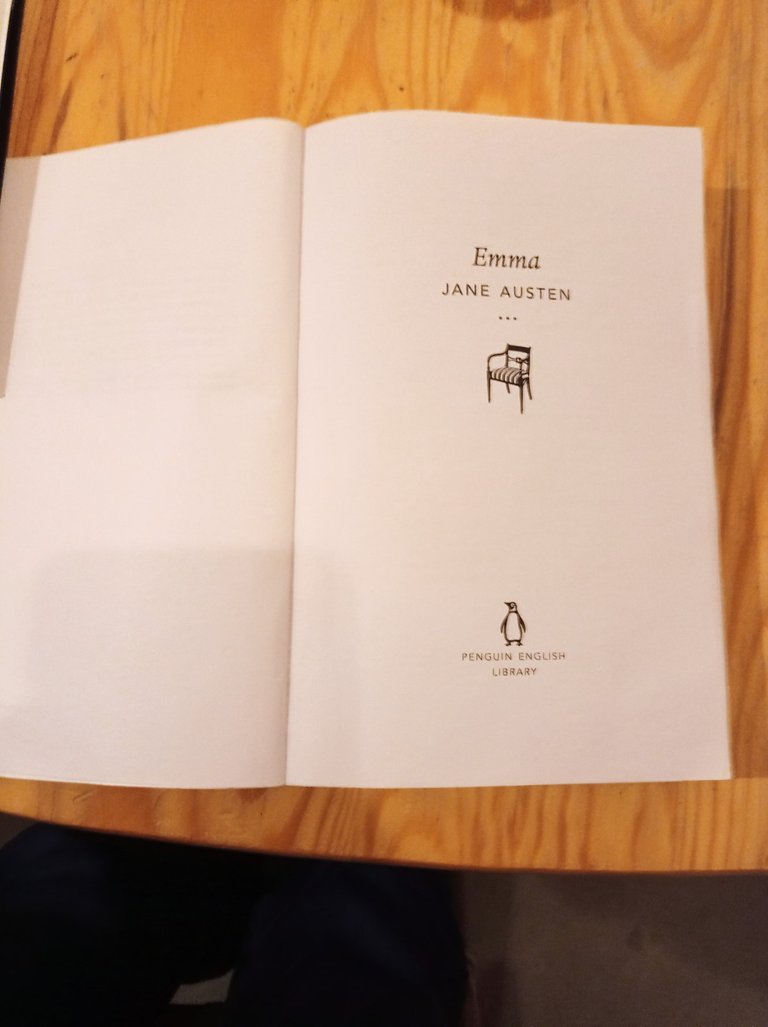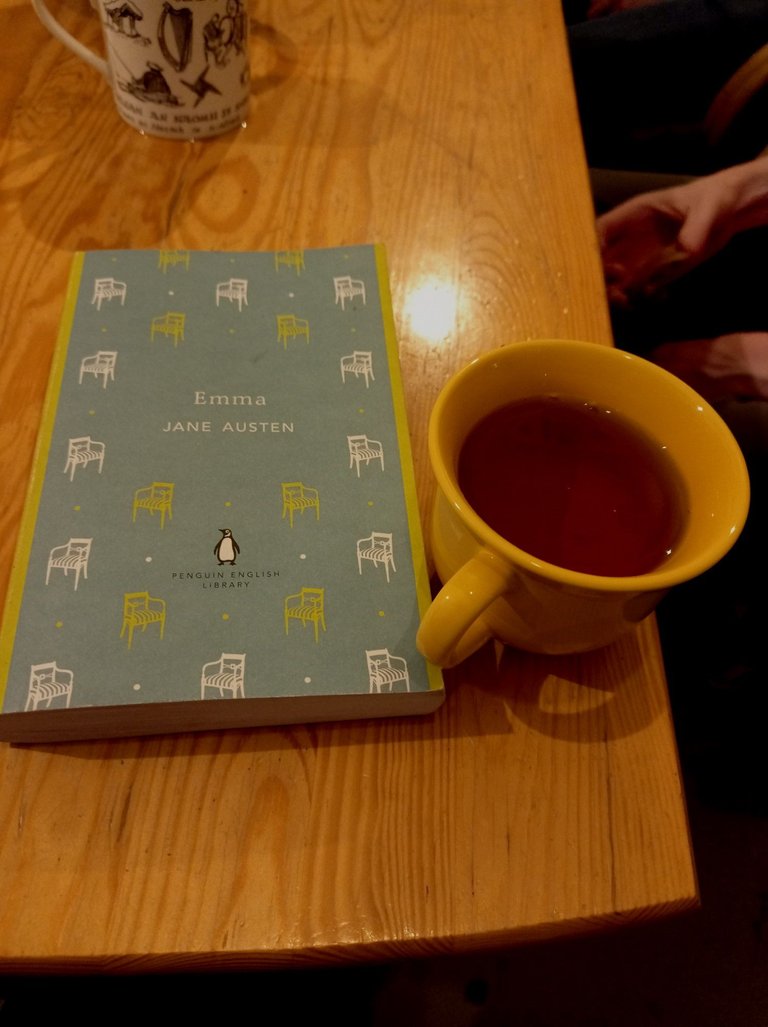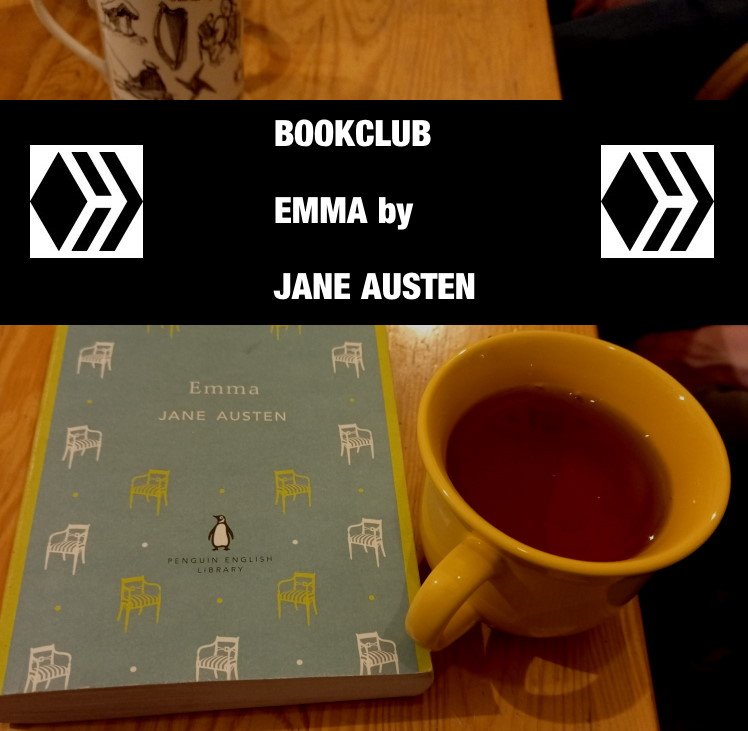Scroll down for the Polish version! | Przejdź niżej, żeby przeczytać polską wersję!
All pictures were taken by me | Wszystkie zdjęcia moje
The first Book Club meeting in 2023 is over. This time we travelled back to good ole England at the beginning of the 19th century. The protagonist of the book is the 20-years old Emma Woodhouse, a lady blessed by the fates with looks, brains and charm. As a daughter of a wealthy landowner, she had a cosy childhood. Living without worries and major ambitions, she begins to imagine that she has a particular talent for matchmaking. She attempts to use her imaginary skills to get a few people married, including her best male friend, Mr Knightley, who is 16 years older than her. Predictably, due to the lack of life experience and her innate arrogance Emma's intrigues and attempts at manipulation will lead to bittersweet consequences.
As usual, the meeting was hosted by the venerable Lorenzo, the chairman of our Book Club. The Steward of the Kingdom, Hallmann, was also present, but he left us quickly due to a nasty cold.
When we started talking, it turned out that two people among us didn't manage to finish the novel. Curiously enough, both of them stopped reading after reaching Chapter 13. The major obstacle in reading Emma to the end was its formidable length (about 500 pages in the English edition). Fortunately, the couple still took part in the conversation, although by asking the others question and adding commentary to their opinions.

No love lost
The proper discussion was opened by Lorenzo who said that he expected to find a typical love story, but to him, the book had little romantic love to offer — even though Emma eventually discovers her feelings for a man. In truth, even though her matchmaking scheme makes a central part of the story, sincere feelings and compatibility between two people in a relationship have little meaning due to social conventions depicted by the author. Instead of that, Austen's work should be viewed as a humorous social commentary, and the subtitle of the original edition points at that: "A Lively Comedy of Manners".
The writer provides a detailed picture of Highbury, a village in the vicinity of London, and its inhabitants, but also creates a more general depiction of British society in the early 19th century. However, she focuses on the social strata usually labelled as "higher". We peek into the daily life of elegant gentlemen and genteel ladies, watch them during meals and social gatherings, and listen to the elaborate language they use even when the subject is a banal thing — multilayered, complex sentences are not unusual. Most importantly, we explore the Byzantine and rigid social ladder that defines all kinds of relationships between people.
One of the Book Clubbers was surprised that the novel never mentions Emperor Napoleon Bonaparte. After all, the first edition was published soon after the fall of the Corsican and it is reasonable to assume that the story is set at the same time, but the topic of Napoleonic wars is never discussed by the characters. Would it be possible for them to completely ignore the disastrous conflict that engulfed most European countries? A certified major in English literature suggested that the unpleasant subject could have been taboo in the high society of that period.

The English: Are they human?
Someone made a joke that the book felt like a fictional story set in India because the depiction of social mores reminded them about the caste system. It may be an exaggeration, but the obsession with social hierarchy seems to be commonplace among the good people of Highbury. A good marriage is defined not by the personal traits of the husband or wife, nor by the quality of their relationship, but rather by wealth, looks and, most importantly, lineage — are the parents of the girl you want to marry blue-blooded enough? Similar concerns determine all relationships between neighbours and the social life of Highbury in general. When two people meet, the person standing higher on the social ladder is always wary to avoid fraternising with the dirty commoner, even if they hide it behind a mask of politeness and good manners.
We were all surprised when one of us said that Emma, a novel published about two centuries ago, remains, to a certain degree, a realistic portrayal of British society, especially its upper classes. Moreover, it was the reason why reading the book was an unpleasant experience for him, to put it mildly. He put it bluntly: "Great work of literature, but I hate this book and every character in it". As it turned out, he had lived in Britain for some time and even worked for the Bank of England. Inevitably, he would meet people from the groups called the upper and upper middle class — the latter better known as "snobs". Austen's novel reminded him, painfully, of their obsession with social status and how they were convinced of being better than the plebs, and how they made sure to make the class barrier visible. His tirade against the perfidious Albion ended with the conclusion that moving to Poland turned out to be a better decision, just because people living on the Vistula river are way less concerned about class divisions.
Apparently, not only does a literary piece written 200 years ago in Britain remains a (partially) valid social commentary, but it makes a nod towards contemporary Poland. It's quite possible that Mrs Jane Austen would be happy to hear about that.
Is Emma worth your time?
After we had spent almost two hours exchanging our opinions on the book, the time came for a conclusion. One of the club members who hadn't finished the novel asked the others if it would be worth the effort to try reading it again. The collective answer was, more or less, like this: certainly, maybe it's not easy reading, but it's a valuable piece of literature. Emma remains an important description of the historical British society — and that portrayal is still partially relevant, as we have pointed out before. Our local expert on British literature added that readers should not be afraid of Austen's writing style. Even if it read differently than contemporary English, the language used in the novel was far less antiquated than he had expected. To wrap it all up, maybe the book chosen for our January meeting didn't make every one of us happy, but we didn't waste our time.
Po polsku
Pierwsze spotkanie Bukklubu w nowym roku 2023 jest już za nami. Tym razem przenieśliśmy się do starej, dobrej Anglii w początkach XIX stulecia. Tytułowa bohaterka, dwudziestoletnia Emma Woodhouse, została hojnie obdarzona przez los urodą, intelektem i urokiem osobistym, a na dodatek jako córka zamożnego posiadacza wiejskiego dorastała w cieplarnianych warunkach. Pozbawiona trosk i wielkich ambicji, żyje w przekonaniu, że posiada wyjątkowy talent do kojarzenia ze sobą damsko-męskich par. Swoje rzekome zdolności próbuje wykorzystać choćby przez wyswatanie swojego najlepszego przyjaciela, starszego o całe 16 lat pana Knightleya. Jak nietrudno się domyślić, brak doświadczenia życiowego i wrodzona arogancja Emmy sprawiają, że jej intrygi i manipulacje prowadzone wśród tzw. dobrego towarzystwa prowadzą do różnych gorzko-komicznych konsekwencji.
Zebraniu przewodził oczywiście niezrównany Lorenzo (@lpa), prezes naszego klubu. Na sali był też obecny Namiestnik Królestwa (@hallmann), ale szybko opuścił nas z powodów zdrowotnych.

Jak okazało się już na początku rozmowy, książka była poważnym wyzwaniem dla dwójki uczestników, którzy nie ukończyli lektury. Co ciekawe, obie osoby utknęły na tym samym, trzynastym, rozdziale. Główną trudność w dokończeniu powieści stanowił pokaźny rozmiar książki (około 500 stron w wersji angielskiej), ale nie przeszkodziło to obu delikwentom w udziale w rozmowie, choć skupili się głównie na pytaniach do pozostałych rozmówców i komentowaniu ich opinii.
Gdzie ta miłość
Otwierając właściwą dyskusję, jeden z obecnych zdziwił się, że spodziewał się standardowego romansu, a w samej książce miłości romantycznej jest jak na lekarstwo — choć przecież Emma w końcu odkrywa ku własnemu zaskoczeniu uczucie do mężczyzna. Rzeczywiście, chociaż fabuła formalnie toczy się wokół kojarzenia par małżeńskich, szczere uczucie i dopasowanie dwóch osób pod względem charakteru grają tutaj drugorzędną rolę ze względu na społeczne konwenanse. Dzieło panny Austen jest więc raczej komedią obyczajową, zresztą podtytuł brzmi dosłownie „a Lively Comedy of Manners”.
Pisarka przedstawia drobiazgowo społeczność Highbury, wsi położonej całkiem niedaleko od Londynu, a przez to maluje także bardziej ogólny obraz brytyjskiego społeczeństwa początków XIX wieku. Należałoby zresztą zastrzec, że skupia się prawie wyłącznie na zamożnych warstwach określanych jako wyższe. Przyglądamy się więc codziennemu życiu szacownych dżentelmenów i dystyngowanych damy, podglądamy ich przy posiłkach i w życiu towarzyskim, słuchamy, jak o banalnych nawet sprawach mówią wyszukanym językiem — zdania wielokrotnie złożone są tutaj normą. Przede wszystkim poznajemy też skomplikowaną i sztywną drabinę społeczną i różnorakie relacje pomiędzy ludźmi zajmującymi na niej pozycję.
Pojawił się głos wyrażający zaskoczenie, że w powieści nie pojawia się namniejsza wzmianka o cesarzu Napoleonie. Jej pierwsze wydanie pojawiło się niedługo po upadku cesarza Francuzów i można założyć, że akcja toczy się właśnie w tym czasie, ale temat nie istnieje w świadomości bohaterów książki. Czy to możliwe, że zupełnie ignorowali by wojenny kataklizm, który dopiero co przetoczył się przez większość Europy? Obecny wśród nas dyplomowany anglista zasugerował, że wspominanie o wojnach napoleońskich mogło być po prostu uważane za niesmaczne w brytyjskich wyższych kręgach tamtych czasów.
Anglicy są jacyś inni
Ktoś z nas zażartował kąśliwie, że przy lekturze miał wrażenie, jakby czytał o indyjskim systemie kastowym u jego rozkwitu, jakby Brytyjczycy zarazili się tą kastowością po opanowaniu subkontynentu. To oczywiście przesada, ale jednak przez całą powieść przewija się obsesyjne przywiązanie mieszkańców Highbury do społecznej hierarchii. O tym, czy małżeństwo jest dobre, decyduje nie sam charakter człowieka i szczęśliwy związek z drugą osobą, ale majątek, uroda i przede wszystkim „dobra krew” (która, jak wiemy dzięki Włochom, nigdy nie kłamie). Podobnie wyglądają zresztą stosunki między sąsiadami i mieszkańcami Highbury w ogóle. Osoba stojąca wyżej na drabinie społecznej zawsze pilnuje tego, żeby nie wchodzić w zażyłość z kimś położonym niżej, chociaż dystans ukrywa się zwykle za uprzedzającą grzecznością i dobrymi manierami.
W dyskusji pojawił się moment prawdziwie zaskakujący, ponieważ jeden z czytelników stwierdził, że Emma, powieść wydana ponad dwa stulecia temu, pozostaje w pewnym stopniu aktualna jako dokładny opis wyspiarskiego społeczeństwa, a raczej jego wierchuszki. Zresztą z tego powodu przeczytanie jej było dla niego, mówiąc delikatnie, nieprzyjemnym przeżyciem. Określił to zresztą bardziej dosadnie: „Dobra literatura, ale nienawidzę tej książki i wszystkich postaci”. Jako człowiek światowy, spędził kiedyś trochę czasu mieszkając na Wyspach i pracując w Banku Anglii. Przy różnych okazjach stykał się i nawet przyjaźnił z tubylcami zaliczanymi do klasy wyższej i aspirującej do tego statusu wyższej klasy średniej. Lektura przypomniała mu aż za dobrze typowe cechy takich ludzi, przede wszystkim obsesję na punkcie własnego statusu, poczucie przynależności do kasty wybrańców i pilnowanie sztywnych granic w kontakcie z plebsem. Swoją tyradę przeciw perfidnym Anglosasom zakończył stwierdzeniem, że przeprowadzka do Polski była dla niego prawdziwą ulgą, bo nad Wisłą jest o wiele mniej kastowości i związanego z nią załgania.
Jak widać, wydana przez dwoma stuleciami brytyjska powieść nie tylko zachowała (po części) swoją aktualność, ale nawet stawia nasz kraj w korzystnym świetle. To chyba świadczy o klasie Jane Austen jako autorki.
Co nam po Emmie
Tak w końcu, po prawie dwóch godziny wymiany myśli i zdań, przyszła pora na konkluzję. Klubowicz pokonany przez rozmiar książki zapytał pozostałych, czy warto do niej powrócić i spróbować przeczytać ją w całości. Odpowiedź można podsumować mniej lub więcej tak: owszem, nie jest to lektura łatwa, ale na pewno kawałek solidnej literatury. Stanowi cenny dokument pokazujący życie dawnego brytyjskiego społeczeństwa — i nie tylko dawnego, jak przekonaliśmy się wcześniej w trakcie rozmowy. Nasz lokalny ekspert od literatury angielskiej dodał przy tym, że nie należy bać się języka. Nie jest to oczywiście współczesna angielszczyzna, ale Emma została napisana w sposób o wiele mniej archaiczny niż się tego spodziewał. Mówiąc krótko, być może styczniowa książka miesiąca naszego Bukklubu nie wszystkich uszczęśliwiła, ale na pewno nikt z nas nie zmarnował swojego czasu.

So you're at an actual book club? Wow. Must be super nice I reckon. Jane Austen is known for her commentary on societal narratives and stereotypes albeit in a subtle way. I think that's part of the endgame with this book. It having a bit of humour makes is my kind of piece
Thank you for sharing.
Sure, we're HIVE-based (that's where we propose books and vote), but we meet at our local HIVE headquarters to have an actual discussion. It's cool when people bring their own copies of the given book and you can compare various editions, translations and so on.
One of the point we touched upon was how secular Austen's novels are. The Church of England seems to serve only as a means to give living and social status to some boring men with no inheritance (Mr Collins in Pride and Prejudice or Mr Elton in Emma.
Another observation was that £ 30,000 (the value of Woodhouse property) at that time would be over two million in today's money, according to the inflation calculator from the Bank of England website.
And as far as Napoleonic wars being a taboo in Austen's time, I've taken this idea from some project film made by highschoolers about the relationship between Austen and their county. Yet, when you look into the two novels by Austen that I've read (Pride and Prejudice and Emma), you don't realy see them mentioned. When you look at Vanity Fair, which was published some thirty years later, you see that Napoleon and his wars are omnipresent mentioned very often, particularly in the part of the book set up to the time of Waterloo, and one of the characters even dies in that battle. Note that Austen's two brothers were in the navy, and one even saw action at Trafalgar.
Right, I now remember that you mentioned those things during our discussion. Maybe I owe you an apology, I really should get better at taking down notes, it's just that the talk sometimes gets too captivating to focus on writing important points down — which is a compliment to our little Club when you think about it.
Greetings, I find it a very interesting story to read, one of those that you enjoy after each word of its extensive narration, in particular I love those long books that keep you in tension after each chapter seemingly unrelated until everything comes together. Good job, I liked your review.